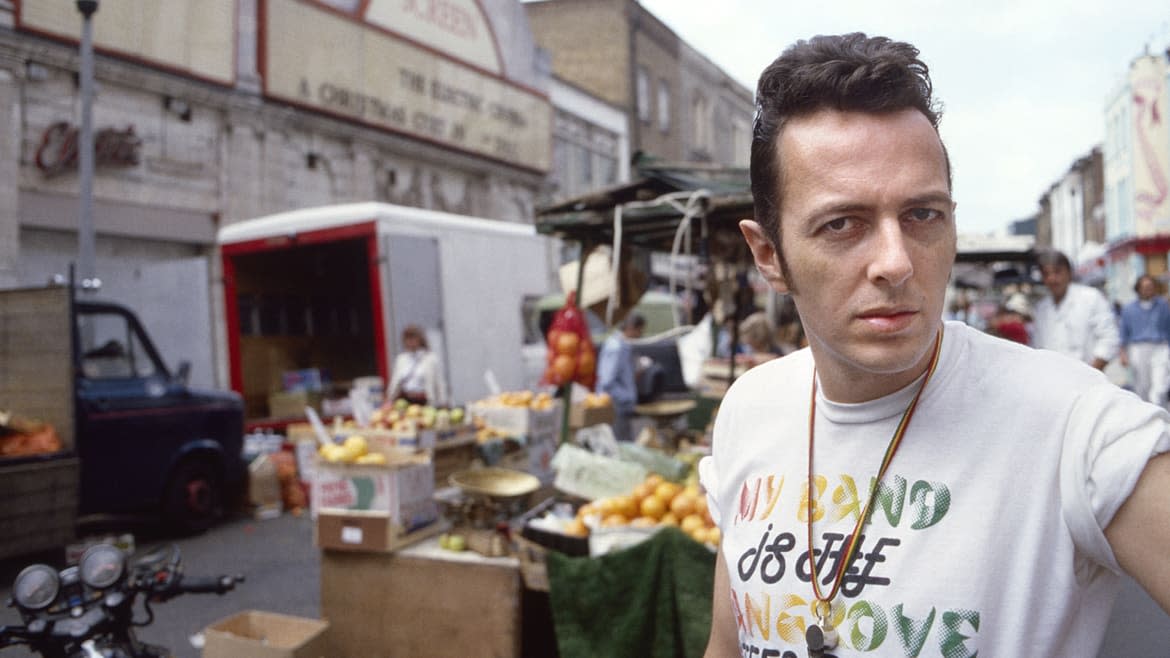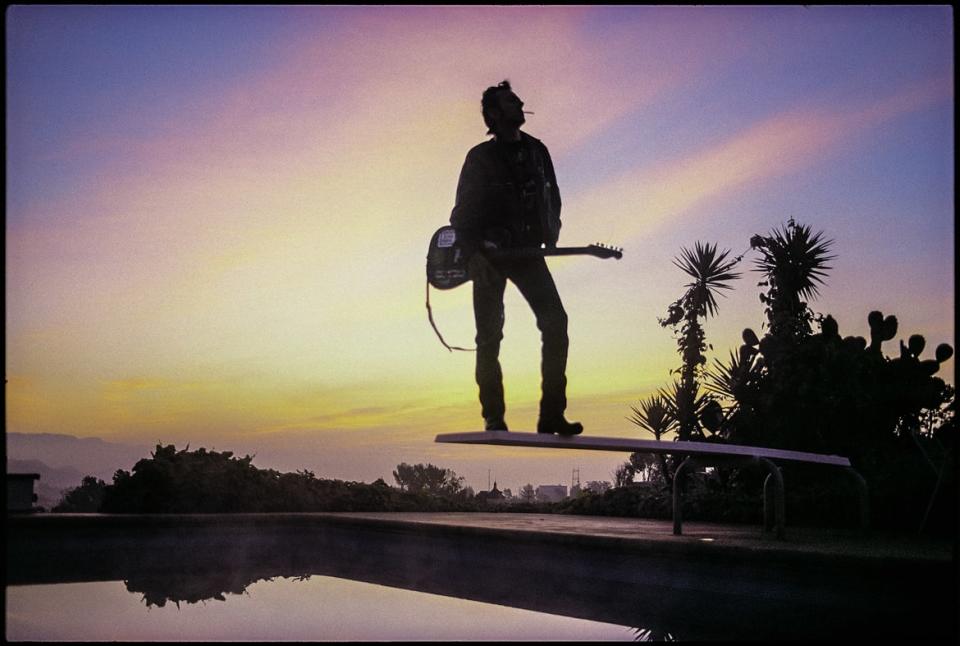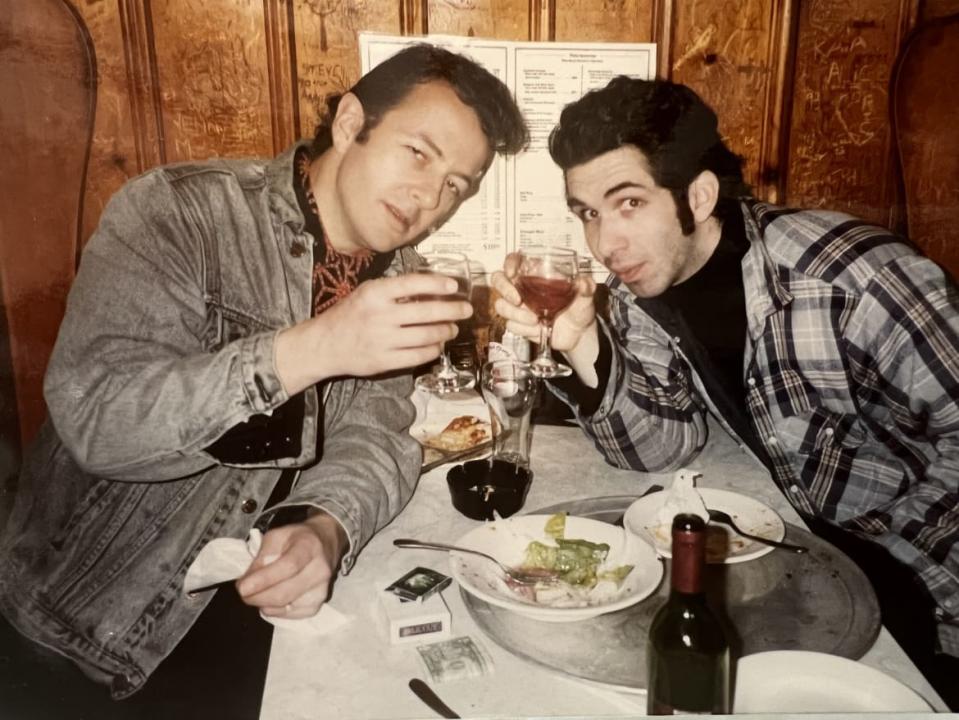The Clash’s Joe Strummer ‘Would’ve Made a Wonderful Old Man’

- Oops!Something went wrong.Please try again later.
“You’ve really got to check out Cumbia,” Joe Strummer insisted, his intense stare burning a hole through me after one too many pints.
“Cumbia?” I wondered. “What the hell is Cumbia?” I didn’t dare ask, but in those pre-internet days, I didn’t even know where to look, or if I’d even heard Strummer right. In some of our first meetings, already almost a decade before, he’d turned me on to everything from Charlie Parker and Woody Guthrie to dub reggae, but that music was relatively easy to find in my local record stores and library. But Cumbia?
The next time I ran into Strummer at the East Village watering hole we frequented during weekday afternoons, he pulled a cassette out of his leather jacket pocket. It was covered with his own fantastical song titles and artists in his unique, exclamatory scrawl, and with hand-colored artwork by the man himself. When I got home later that sunny afternoon, I listened well into the night. I was trying to make sense of what I was listening to, and why Strummer wanted me to hear it. The blend of Latin sounds, rhythmic and enchanting, featuring flutes, horns, maracas, accordions and percussion, behind vocals that blended Latin, African, Native American and European stylings, was unlike anything I’d ever heard. It was both beautiful and chaotic, much like Strummer himself.

Joe Strummer at Lookout Mountain, Los Angeles. 1989.
Joe Strummer, The Clash’s iconoclastic frontman, would have turned 70 years old today, which is as hard to imagine as it is sad that he’s not here with us to mark the occasion. And while the band that made him a household name recently released an expanded edition of its best-selling album, Combat Rock, his birthday is being marked by two releases that no doubt would have made the sometimes irascible Strummer smile, because they both showcase the Joe Strummer with whom I was lucky enough to cross paths that handful of times over a quarter century ago.
Joe Stummer 002 is the second anthology volume drawn from his post-Clash work. Unlike Joe Strummer 001, released in 2018, which copiously chronicled the period from the mid-1980s, just after the demise of the classic lineup of The Clash right up until Strummer’s untimely passing in 2002, the new box set is laser-focused on his studio work from 1999-2002 with the band he loved so much, the Mescaleros.
“I think he came alive again with the Mescaleros,” Lucinda Tait, Strummer’s widow, insists. “It was an extraordinary time, when Joe had met these musicians who were not only very talented, but multi-instrumentalists. Joe’s musical taste was very eclectic, and he was able to explore all the music that he’d been listening to over these years. It was so exciting to him to work with a group who, when he had an idea, they could pick it up and make it into something. He was energized and invigorated and just felt alive again, musically.”
Hayley Kiyoko Wants to Host an LGBTQ ‘Bachelorette’ Season
So, while the collection includes remastered editions of all three of Strummer’s late-career albums with the Mescaleros—1999s Rock Art and the X-Ray Style, 2001s Global A Go-Go, and the posthumous Streetcore, from 2003—which boasts deep dives into the rock and roll, rockabilly, reggae, hip hop, electronica and EDM Strummer loved so dearly, they also feature a healthy helping of the world music one of the true giants of punk rock was so enthralled by, from Celtic to, you guessed it, Cumbia. It also includes fifteen rare and unreleased tracks, spanning the first demos Strummer wrote for the band, as well as “Ocean of Dreams,” featuring Steve Jones of the Sex Pistols on guitar, and outtakes of some of Strummer’s final recordings with the Mescaleros.
“I can still choke up when I hear his voice—especially when he’s in the studio and he’s just talking—it hits me, absolutely,” Tait tells me of revisiting Strummer’s late-career work. “But so much of it is funny, too, that it makes me laugh and it makes me smile. So, it’s still raw. That doesn’t just go away with time. But he was very proud of his work, and I think it’s relevant to hear today, especially some of his more political lyrics. I don’t want to sound grandiose, but I think Joe’s work was important, and I like the thought that a younger generation of people who aren’t aware of his music might get the chance to hear it.”
And while there’s probably no better way to celebrate Joe Strummer than with a large helping of his music featured in the new box set—much of which you’re likely unfamiliar with, and which stands tall against his best work with The Clash—photographer and longtime Strummer collaborator Josh Cheuse’s new book Print the Myth is a gorgeous and intimate photo book that, remarkably, somehow peels back the Joe Strummer myth to reveal more of the man than most of us were likely ever privy to.
“It was a big undertaking,” Cheuse confesses. “How do you do Joe Strummer justice? How do you have the right balance? How can this thing encapsulate a working relationship between two friends who got along, when obviously, he was also a mentor to me and taught me so much? Those questions loomed large. But then, he also taught me to just get on with it. So that’s what I did.”
Cheuse’s photographs begin with the shots he took as a teenager during The Clash’s infamous 17-show stand at Bond International Casino in New York City’s Times Square in 1981, when the band brought the city to a standstill and set themselves on the trajectory toward superstardom, through the mixing sessions for Combat Rock the following year, Strummer’s work with Mick Jones’s post-Clash band Big Audio Dynamite, his days in Los Angeles making his first solo album Earthquake Weather (which features Cheuse’s infamous silhouetted shot of Strummer with his trusty Telecaster on its cover), through family trips to Glastonbury and his all-to-brief years globetrotting with the Mescaleros, alongside the notebooks and ephemera Cheuse collected over the two-plus decades he knew Strummer.

Joe Strummer performing at his last concert in Brooklyn. 2001.
Trust me when I tell you that Print the Myth is full of shots of Strummer you’ve never seen before. I’ve known Cheuse off and on since the ‘80s and there are hundreds of photos in the book I’d never seen. (“Even my wife hadn’t seen them,” Cheuse told me with a chuckle.) Best of all, these aren’t the outtakes you too often get in these types of “never seen before” books. Both the artfulness and intimacy of every shot in Print the Myth makes you feel as if you’re transported back in time, in the room with Joe Strummer.
“I think the main thing I wanted to show was the creative process,” explains Cheuse. “People think that a lot of the time you’re just hanging around or goofing off, but when you’re in the studio, it’s this sacrosanct place, and it’s actually this amazing creative space—this kind of safe space. It was important to me to give people a window into that.”
For Cheuse, it was paying back Joe Strummer by, hopefully, paying it forward.
“I joined the circus with those guys when I was 16, when Joe led me down the stairs at Electric Lady and said, ‘Get to it,’” he explains. “That was the beginning of my career. And so, I’m very thankful for everything I learned around him, and I wanted to honor it. If I can continue that spark that started me on my creative journey and turn people on and inspire them to find that thing they love and to do it until they can’t do it anymore, and not just live in this kind of social media haze, then that will keep the flame going.”

Joe Strummer and Josh Cheuse
Print the Myth more than honors that idea.
Of course, for those who knew him so well, Strummer’s 70th birthday will be bittersweet.
“It would be really great to have him around right now, because he would have a great take on things,” Cheuse says, a bit wistfully. “I always thought that we would be old dudes sitting in the pub with a dog having a pint, going, ‘Remember the time we were at that Prince concert, and you were sneaking people in, and they threw us down the stairs?’ I thought we would be old geezers. I never thought that he would bow out when he did. But what would have Joe made of Trump? Maybe it was a good time to get out before things really went to shit.”
“Oh, Joe would’ve made a wonderful old man,” his widow Lucinda says as we wrap up our conversation. “I could never even begin to speak for Joe, but I think he would’ve had a lot to say. I think that pencil would’ve been out, and those fingers would’ve been flying across the old typewriter, bashing out lyrics, pouring out his anger and frustration. But mostly, it’s sad that he’s not around to see his incredible grandchildren. And he’d be so proud of his children. So, that gives me great pangs of sadness. But that was what his story was, wasn’t it? Go quick. Go early.”
Get the Daily Beast's biggest scoops and scandals delivered right to your inbox. Sign up now.
Stay informed and gain unlimited access to the Daily Beast's unmatched reporting. Subscribe now.

